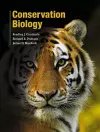
Conservation Biology
3 authors - Hardback
£128.69 was £142.99
Bradley Cardinale is a Professor in the School for Environment and Sustainability at the University of Michigan where he also serves as Director of the Cooperative Institute for Great Lakes Research. Cardinale is an elected fellow of the American Association for the Advancement of Science (AAAS) and the Ecological Society of America (ESA). His research and teaching integrate perspectives from the natural sciences, social sciences, engineering, and design disciplines to improve efforts to conserve and restore biodiversity, and to protect the ecosystem services that biodiversity provides to society. He has published more than 120 scientific papers and popular articles, and has ranked as a Highly Cited Researcher in the field of Ecology & Environment for most of the past decade. In 2014, Cardinale was named one of 'The World's Most Influential Scientific Minds' by Thomson Reuters, one of the main sources of impact factors used in the assessment of scientific work. Richard Primack is a Professor of Biology at Boston University with a specialization in plant ecology, conservation biology, tropical rain forest ecology, and climate change biology. He has been a visiting professor in Germany, Japan, China, and the Czech Republic, and a Guggenheim Fellow and a Humboldt Research Fellow. He is the author of two widely used conservation biology textbooks; local coauthors have helped to produce thirty-six translations of these books with local examples. He is also the author of the popular book Walden Warming: Climate Change Comes to Thoreau's Woods (2014). He has served as Editor-in-Chief of the journal Biological Conservation and as the President of the Association for Tropical Biology and Conservation. His research has centered on the ecology of tropical rain forests in Malaysia and the impacts of climate change on the plants and animals of Massachusetts. James D. Murdoch is an Associate Professor and Director of the Wildlife and Fisheries Biology Program in the Rubenstein School of Environment and Natural Resources at the University of Vermont. He is a wildlife biologist and received his doctorate through the Wildlife Conservation Research Unit (WildCRU) at the University of Oxford. Much of his research focuses on the behavior, ecology, and conservation of carnivores, and examines questions related to the effects of landscape change on the abundance and distribution of species at field sites in Asia, Africa, and North America. He also served as a Fulbright Scholar in Mongolia, and is a member of the IUCN/SSC Canid Specialist Group and Board of Trustees of The Nature Conservancy in Vermont.